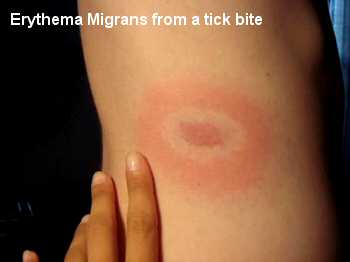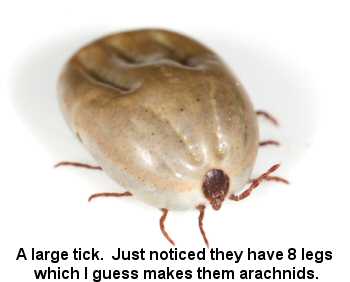The Haven
Healing Centre
The Orchard
Draycott Rd, Cheddar
Somerset

The Haven |

|
| Natural Complementary Therapies - your key to improved health and well-being | |
|
Home About Contact Gift Solutions Articles Treatments Products Page: 1 2 3 4 5 Appointments |
Chronic Lyme Disease and Lymphatic DrainageManual lymph drainage relieves chronic lyme disease symptomsTICKS! I can't think of much worse than this horrible creature, or what purpose they serve in the grand scheme of things, but I guess someone had a good reason to invent them in the first place. Our cat used to love sleeping in the long grass, so it became a daily search and rescue to get the ticks off her with this special tool I got from the pet shop. I even found one on the wooden stairs once that was so fat with blood that it could no longer get home to it's cosy hiding place behind the plank, as it was stuck in the gap between the boards. Right, enough about ticks. If you've got Lyme Disease, or now sometime after the original incident, Chronic Lyme Disease, then it probably all started with, you guessed it, a tick bite.  Tick bite evidence - Erythema Migrans
Tick bite evidence - Erythema MigransOften people with early-stage Lyme disease develop a distinctive circular rash at the site of the tick bite around 3 to 30 days after being bitten. This is known as erythema migrans, which is Latin and literally means 'migrating redness'. What is Lyme Disease? Lyme disease, or Lyme borreliosis, is a bacterial infection spread to humans by infected ticks. Ticks bite infected animals, and then us when we visit their habitat, such as long grassy fields, woodland and areas of heathland. Who would have thought that the pleasant past-time of picnicking in the countryside could be so dangerous? It is estimated there are 2-3,000 new cases of Lyme disease in England and Wales each year. Early detection and treatment can mean a successful outcome for sufferers. The problems seem to come when treatment is delayed or not given. This can lead to the infected person developing sever and long-lasting symptoms. Joke: Do you know why ticks make the best lawyers? They're already a blood sucking pest, all they need is a briefcase......... (sorry, couldn't resist that one What signs and symptoms should I look out for to determine if I have Lyme disease? Firstly, your doctor is probably the best place, many of the symptoms are similar to other conditions, and they can organize blood tests to differentiate between conditions. In the UK, two types of blood test are used to ensure Lyme disease is diagnosed accurately. This is because of possible false positive results when only a single blood test is taken. Erythema Migrans looks a bit like a bull's-eye on a dart board. The affected area of skin will be red and the edges may feel slightly raised. Some people may develop rashes in different parts of their body which can also vary widely in size. Some people with Lyme disease also experience flu-like symptoms in the early stages, such as tiredness (fatigue), muscle pain, joint pain, headaches, a high temperature (fever), chills and neck stiffness. What happens if I don't get early treatment or delay seeking help? Panicking if you get a tick bite is NOT the answer. You can have 50 tick bites or more before you encounter one with Lyme. Even then, the tick needs to be holding on for 24-36hrs for the bacteria to transfer. If you are bitten, it sometimes feels like a sharp sting, so you know about it straight away, or because of soreness, a short time after. Lyme disease does not appear to be transmissible between people, by other animals, or through food. You should see your GP if you develop any of the symptoms above after being bitten by a tick, or if you think you've been bitten. Make sure you let your GP know if you've spent time in countryside areas where ticks are known to live. If you have a spreading rash some days after a tick bite your doctor will likely prescribe appropriate antibiotics without waiting for the results of any blood test. Long term symptoms of untreated or late treated Lyme disease include: • pain and swelling in the joints (inflammatory arthritis) • problems affecting the nervous system – such as numbness and pain in your limbs, paralysis of your facial muscles, memory problems and difficulty concentrating • heart problems – such as inflammation of the heart muscle (myocarditis) or sac surrounding the heart (pericarditis), heart block and heart failure • inflammation of the membranes surrounding the brain and spinal cord (meningitis) – which can cause a severe headache, a stiff neck and increased sensitivity to light These more serious symptoms can develop weeks, months or even years after the original Lyme disease diagnosis. Treatment can sometimes help the less persistent symptoms. A few people with Lyme disease go on to develop long-term symptoms similar to those of fibromyalgia or chronic fatigue syndrome. This does not mean you are still infected with Lyme. On the contrary, this phase of the condition is known as post-infectious Lyme disease. It's not clear exactly why this happens, but it's likely to be related to overactivity of your immune system rather than persistent infection. What treatments are available? If you develop symptoms of Lyme disease, you will normally be given a course of antibiotic tablets, capsules or liquid. You will need to keep these going for 2-4 weeks, depending on the stage of the condition. It is always important to take the whole course, even if you are feeling better, because this will help ensure all the bacteria are killed. Anti-biotic side effects in this instant can make you more sensitive to sunlight for the course of your treatment.  How do I reduce my potential exposure to Lyme disease?
How do I reduce my potential exposure to Lyme disease?• keeping to footpaths and avoiding wandering into long grass when out walking • wearing appropriate clothing in tick-infested areas, ie. long-sleeved shirt and trousers tucked into your socks • wearing light-coloured fabrics can help you spot a tick on your clothes • using insect repellent on exposed skin • inspecting your skin for ticks, particularly at the end of the day, including your head, neck and skin folds (armpits, groin, and waistband) • remove any ticks you find promptly with the appropriate tool • checking your children's head and neck areas, including their scalp • making sure ticks are not brought home on your clothes • checking that pets do not bring ticks into your home in their fur What's the best way to remove a tick? Gently grip it as close to the skin as possible using a pair of fine-toothed tweezers and then steadily pull it away from the skin, being careful not to leave jaw parts, or head parts in the skin. DO NOT grip with the fingers or finger-nails and twist or crush the tick to pull it away. The entire contents of the tick can be pushed back into the bite hole. Finally, wash your skin with water and soap afterwards, and apply an antiseptic cream to the skin around the bite. Personally, I use surgical spirit first, and then antiseptic cream. Some vets and pet shops sell plastic tick removal tools, which are a worthwhile addition to any first aid box. Phil, why do you think that Manual Lymph Drainage will help my Chronic Lyme Disease? The body has one main defence mechanism that is absolutely brilliant in the short term, and that is the inflammatory response. Without it we would be in constant pain, poisoned beyond our ability to deal with it, wounded, broken and falling apart. Inflammation is the key to recovery. It triggers the production of repair chemicals in the body and delivers them. It provides lubrication and a fluid agent to dissolve and neutralize any trapped toxicity, damaged cells, stagnant fluids and materials at the wound site which can be transported away to lymph nodes for processing. Ultimately the body can heal from quite serious wounds and disease. Sometimes, as is the case with anything chronic, the inflammatory response hangs around too long. It makes itself an unwelcome guest and eventually becomes its own trigger. Inflammation becomes oedema. Oedema becomes this thick stagnant fluid that is too viscous to move easily away from the site. It becomes an ideal breeding ground for the very bacteria it was designed to flush out in the first place. When I look at the symptoms of long-term lyme disease, many of them seem to be the same symptoms that you would get from long-term oedema and/or inflammation of the part of the body affected. You see, you no longer have lyme disease, but the body is still reacting as though you have, causing these symptoms. Long-term inflammation will also give you these symptoms, and so if you can see that the symptoms are now triggering an inflammatory response, you have a viscious cycle that the body can't break. By addressing the oedema/inflammation issues, it is possible that the body will realize that it is stuck in this cycle and start to reverse the process of degeneration. Some experts question whether 'chronic lyme disease' actually exists as a diagnosable disease, but then they're not the ones suffering, are they? Use MLD to support you during your recovery from Lyme disease. It is possible and likely that if you are suffering with Chronic Lyme Disease you will find manual lymphatic drainage will give you a little nudge toward a more comfortable life. Just a few treatments, on a regular basis, while you are in recovery will accelerate and support your recovery like nothing else around. If this idea resonates with you, I invite you to visit The Haven Healing Centre in Cheddar for a course of treatments. Appointments and a treatment price list are available by clicking here. I look forward to welcoming you soon. Phil. Please share this page with your friends. Thank you.
Note: DISCLAIMER: This information is not presented by a medical practitioner and is for educational and informational purposes only. The content is not intended to be a substitute for professional medical advice, diagnosis, or treatment. Always seek the advice of your physician or other qualified health provider with any questions you may have regarding a medical condition. Never disregard professional medical advice or delay in seeking it because of something you have read. It's a small investment in yourself, but could be a life-changing experience you will cherish forever. |
| Copyright © Philip Chave 2010- TheHavenHealingCentre.co.uk All rights reserved. Email: privacy |